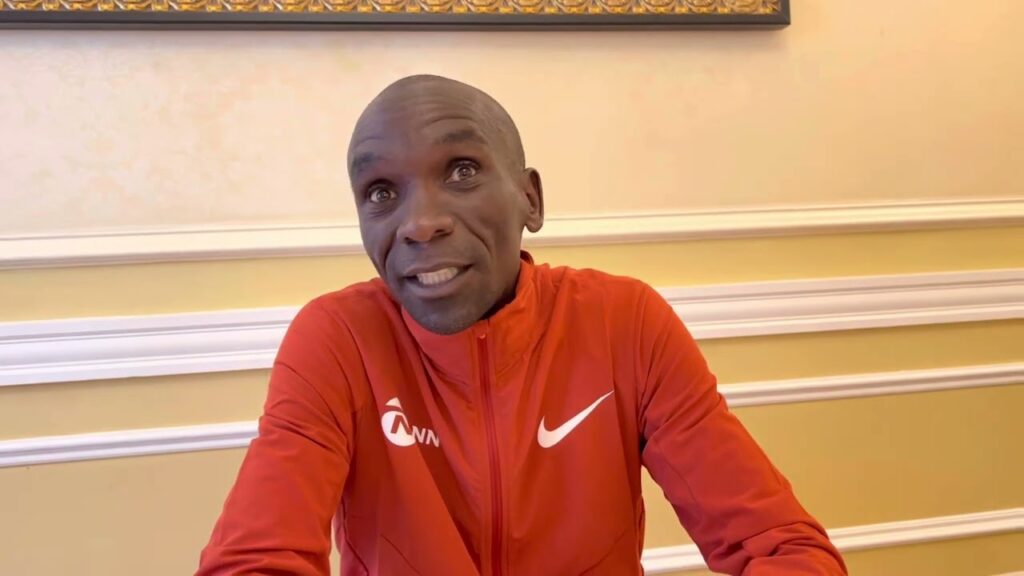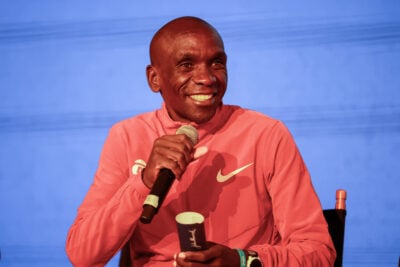New Course, Same Training: Eliud Kipchoge Didn’t Alter His Training at All for Boston Marathon
By Jonathan GaultBOSTON – Monday’s Boston Marathon will be the 20th marathon of Eliud Kipchoge’s storied career (we’re counting those sub-2:00 attempts). Considering he has only been defeated in two of those races, Kipchoge and his coach Patrick Sang have a pretty good idea of how to prepare for a race. And he says that even though Boston will be the first marathon of his career to feature significant hills, he has kept the same training program that has delivered him so much success on flat courses – including two world records and two Olympic gold medals.
“I did not change any training towards Boston Marathon,” Kipchoge says. “I trained as usual. Kenya is up and down, our training cycle fits Boston…I trust the buildups actually will accommodate every course, every race in this world.”
Talk to an American elite preparing to run Boston and you’ll hear about hill training, workouts to practice downhill running, and mid-winter weekend trips to Boston to preview the course. It’s a little more complicated for Kipchoge to travel to Boston from his base in Kaptagat than it would be for an American pro, but he did not appear especially bothered to have missed out. Kipchoge did tour the course by car on Thursday, from the start in Hopkinton to the finish on Boylston Street, but likely will not run on it at all before race day.
“I got to run in my mind,” Kipchoge says of his course tour.
How will he handle the Boston Hills?
After running nothing but flat marathons, the entire running world is wondering how Kipchoge will handle the hills in Boston. Kipchoge himself is not particularly bothered. That is the confidence that a decade of marathon dominance earns you. When you never lose, when you run times previously considered impossible, why would you fret over a couple of hills?
“The hills are there,” Kipchoge says. “They are good. Challenging us.”
Most marathoners speak about “respecting the distance” and in Boston specifically, “respecting the course.” Nothing Kipchoge has done in the leadup to this race has been disrespectful. But he’s not going to totally overhaul a system that has produced unparalleled marathon success. He will stick with what got him here and trust that it works in Boston just as it has worked in Chicago, London, Berlin, Rio, Tokyo…
Why worry about the weather?
One of the biggest variables in Boston from year to year is the weather. Currently, Monday’s weather forecast calls for headwinds out of the east with a 40% chance of rain. But Kipchoge’s coach Patrick Sang says he won’t talk to Kipchoge about it before the race.
“We see that there is a possibility of rain and things like this, probably a headwind, but those are things you never discuss with the athletes because you instill unnecessary anxiety,” Sang says.
Monday’s race will also present tactical challenges that Kipchoge rarely faces. Most Kipchoge marathons are simple – he follows the pacemakers through a quick opening half, keeps pushing in the second half, and either outlasts or drops the hammer on his opposition as necessary. But in Boston, Kipchoge will have decisions to make from the opening step. Will he go to the front and try to instill a quick early pace – perhaps to stifle the closing speed of Benson Kipruto and Evans Chebet, who used savage late-race moves to break open the race en route to victories in 2021 and 2022, respectively? Or will Kipchoge play things more conservatively, biding his time and not risking a big move before the Newton Hills (miles 16-21)?
Sang will leave it up to Kipchoge to decide during the race. His belief: no one can predict how their athlete is going to feel on race day. He will trust Kipchoge to know his body and to make the correct decision about when, where, and how hard to push.
“You can say what you want to say [as a coach], but they have to internalize the fact that I’m running the distance and the course is like this and I’m going to use my energy like this,” Sang says. “Because it’s only the athlete. You can advise, but it’s only the athlete [that knows how they’re feeling].”
Another big talking point ahead of Monday: Geoffrey Mutai’s 2:03:02 course record, which has stood unchallenged since 2011. At the time, Mutai was the world’s top marathoner, and he had the benefit of a once-in-a-generation tailwind. As a result, no one has come within three minutes’ of Mutai’s time since that race. But if anyone can take down the record, Kipchoge would be the guy. Is he targeting the CR on Monday?
“I am targeting the win,” Kipchoge says with a knowing smile.
***
After 10 years of dominance, Kipchoge showing no signs of slowing
If there’s one event in distance running where one can succeed deep into one’s 30s and even one’s 40s, it is the marathon. Meb Keflezighi won Boston at age 38 in 2014; when Edna Kiplagat won two years ago (after the initial winner Diana Kipyokei was busted for drugs), she was one month shy of her 42nd birthday. Kipchoge is officially 38 years old (though some believe him to be a couple years older) and still going strong: he set a world record of 2:01:09 in his last race in Berlin in September. I asked Sang whether he has seen any sign of aging in Kipchoge in practice.
“I haven’t seen it yet,” Sang says.
Kipchoge burst onto the scene in 2003, when he famously defeated fellow legends Hicham El Guerrouj and Kenenisa Bekele to win the 5,000 meters at the World Championships in Paris, and he has remained one of the world’s very best distance runners ever since. Most athletes who have been at the top that long tend to make adjustments as they age – cutting workouts short or taking more time to recover between sessions to protect their health. Yet Kipchoge says he has not had to make many adjustments.
“If my muscles still handle the training, I don’t think of age,” Kipchoge says.
He has also been remarkably healthy throughout his marathon career. It is almost inconceivable that an elite marathoner could go 10 years without ever withdrawing or dropping out of a marathon due to injury. Yet that is what Kipchoge has done.
How is that possible? Kipchoge says that he gets injuries, just like everyone else. The key, he says, is addressing any issue quickly before it becomes more serious. His physiotherapist, Peter Nduhiu, has worked with Kipchoge for 20 years and lives alongside him in Global Sports Communication’s Kaptagat training camp.
“It’s part of any marathon, always training for marathon, injuries are there,” Kipchoge says. “But because we have the right system to work on, then we solve immediately…We have the right people to do it.”
Right now, Kipchoge can still handle the same sessions Sang threw at him five years ago without issue, which makes him the red-hot favorite in Boston. He knows that will not always be the case. Some day, whether due to retirement or an eventual decline, he will slow down, and he has made peace with that fact.
“Age is coming,” Kipchoge says. “One day I will quit and that’s okay.”
Full pre-Boston 2023 interview with Kipchoge









